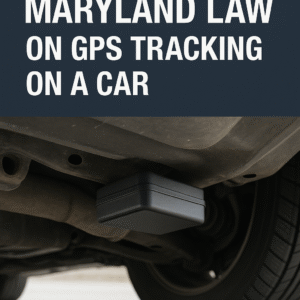Can You Legally Put a GPS Tracker on a Vehicle You Own in Maryland?

Maryland Law on GPS Tracking
Maryland law takes a strict stance on tracking devices. Under Maryland Criminal Law § 3-802, stalking includes using a device to “pinpoint or track the location of another without the person’s knowledge or consent.” This means that even if you are the registered owner of a vehicle, secretly placing a tracker to monitor another person can expose you to criminal liability.
For reference, see our guide on privacy laws in technology use for how similar rules apply in different states.
Does Vehicle Ownership Protect You?
Being the sole registered owner gives you property rights over your vehicle. However, ownership alone is not a defense if the tracker is used to monitor a person without their consent. Courts and prosecutors focus on the effect of your conduct, not just who owns the vehicle.
For more background, see our article on civil privacy claims and how tracking devices can trigger lawsuits.
Risks Beyond Criminal Charges
- Criminal liability: A conviction for stalking in Maryland can result in up to 5 years in jail and/or a $5,000 fine.
- Civil lawsuits: Someone who is tracked without their knowledge may file claims for invasion of privacy or emotional distress.
- Family or employment contexts: Secret tracking of a spouse, partner, or employee can lead to protective orders, exclusion of evidence in court, or employment law issues. Learn more in our guide to employee monitoring policies.
Safer Alternatives
If your intention is theft prevention, GPS tracking can be appropriate, but you should document that purpose and ideally make the tracking clear to drivers. Better yet:
- Get written consent from anyone who drives the vehicle. Use our resource on drafting consent agreements.
- For workplaces, establish a clear fleet tracking policy. See our post on employee GPS tracking best practices.
- For family use, consider shared location apps that require mutual agreement.
Final Thoughts
In Maryland, being the only name on the vehicle title does not automatically shield you from stalking or privacy laws if you track someone without consent. The safest approach is to be transparent, get written consent, and ensure your use of tracking technology cannot be misinterpreted.
Consider consulting with a criminal or privacy lawyer to review your specific situation. You can send them a copy of this blog, and they will read it for free since they are sponsoring this chat. Or, if you want help drafting consent language, consider using a lawyer-supervised AI — they have a free trial and a custom process for agreements. (Sponsored)
Disclaimer: This blog is for informational purposes only. It is not legal advice. Laws can change, and outcomes depend on the specific facts of each situation. Always consult with a licensed attorney for advice tailored to your circumstances.
